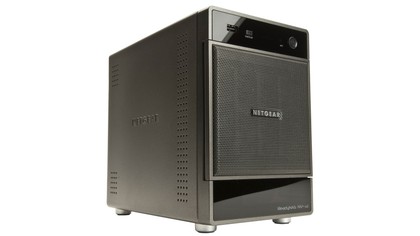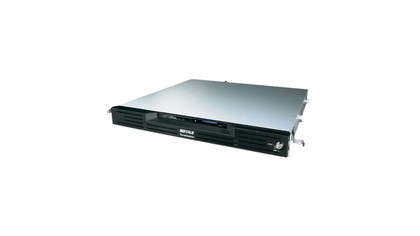Inside the NAS is powered by a dual core 2.13GHz Intel Atom with 2GB of memory. A dual port gigabit LAN connection can happily hit 100MBps.
Good cloud support helps makes the Imation DataGuard T5R a good all round back-up solution with Dropbox, Amazon S3 and OpenStack support. The inclusion of RDX could make this attractive to some businesses and it performs well, but otherwise it lacks services provided by many other NAS models and it is costly.
9. Netgear Ready NAS NV+ v2 RND4000

The Netgear Ready NAS NV+ v2 is classed as a "prosumer" device by Netgear, but remains suitable for home offices and the smaller end of the SMB segment when low demand expanded shared network storage is required. With four removable SATAII drive bays the Netgear RND4000, to use its Netgear codename, supports 3TB drives for a maximum capacity of 12TB. Currently 4TB are not on the comparability list.
Based on the slower 1.6GHz Marvel ARM processor with 256MB of memory, it's not going to provide the raw power to handle demanding environments. It does support RAID 0, 1 and 5 plus the Netgear X-RAID2, which makes on-the-fly upgrades very easy. Impressively there are three USB 3.0 ports and a single USB 2.0 port installed.
A basic software back-up solution is provided. CIFS, NFS, FTP and HTTP network protocols are supported with DLNA for media streaming, which are the basics you'd expect.
In use sequential reads hit 80Mbps but writes suffered at under 40MBps, showing the slower processor struggles with anything but basic access. The saving grace is that the build quality is solid, and at this price with its four bays it's ideal if you just want basic NAS storage.
10. Buffalo TeraStation Pro Rackmount

Built around a slimline 1U rackmount, the Buffalo TeraStation Pro Rackmount model comes in 8TB or 4TB models with its four hot-swap drive bays preinstalled. This might not be to everyone's liking, and only Buffalo's drive kits can be used as replacements.
Get daily insight, inspiration and deals in your inbox
Sign up for breaking news, reviews, opinion, top tech deals, and more.
This new range is built around a 1.66GHz dual-core Intel Atom and 2GB of memory, so it's suitable for the SMB that's after increased storage capacity.
Dual port gigabit LAN connection caters for the networking connections and supports load balancing. While there are two USB 3.0 and two USB 2.0 ports beside this, iSCSI is not supported, which limits its usefulness in larger IP SAN environments.
In-use RAID 0, 1, 5, 6 and 10 are supported, along with automatic replication to a second TeraStation and Amazon S3 cloud storage. Performance manages to hit around 100MBps read but writes seem to struggle. For back-up a ten user NovaBACKUP licence is thrown in.
The system supports the less useful 128-bit AES per volume. Buffalo seems to have taken a potentially useful product and hobbled it with its insistence on proprietary media, the lack of iSCSI functionality and mediocre performance.